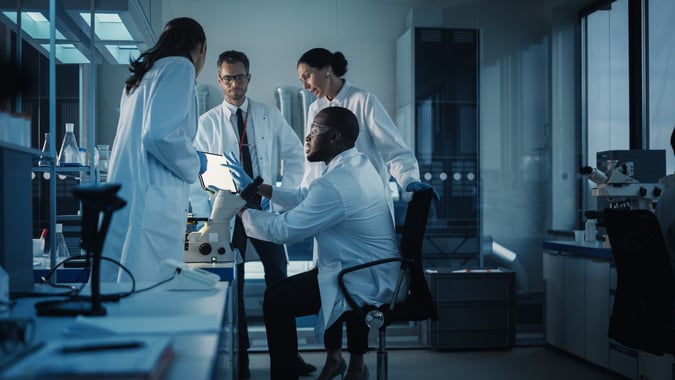Just a cursory look at some of the greatest scientific breakthroughs of the past will demonstrate that collaboration is a prerequisite for success. Take the double helix structure of DNA, for example, which was discovered thanks to the combined effort of James Watson, Francis Crick, Maurice Williams, and Rosalind Franklin. Or the Human Genome Project which set out to successfully read and record the entire sequence of the human genome - something that was only possible through the collaborative efforts of 18 countries and involved thousands of scientists.
The International Rice Research Institute (IRRI) produced one of the first of the modern, high-yielding, varieties of rice that helped stave off the mass famine that was predicted for Asia in the 1970s. Today, a global network known as the Consultative Group for International Agricultural Research (CGIAR) continues this work through the combined efforts of its 16 research centres.
I could go on…
While history often places individuals such as Alber Einstein, Marie Curie, Charles Darwin and others as lone geniuses, if you delve a little deeper, you will see that even these famous scientists were building upon the work of those that came before them, sought advice from colleagues and even had the support of junior assistants.
Today, thankfully, it is easier than ever to collaborate and partner with other scientists and researchers and we are all reaping the benefits. Technological advancements mean that today’s modern laboratories have access to powerful laboratory management systems that are specifically designed to improve collaboration while also supporting more streamlined lab operations.
Breaking down barriers
These cloud-based, secure systems have advanced features that break down the barriers of distance and time zones. With real-time data sharing, project tracking, and communication tools, laboratory teams can work together as if they are in the same lab, no matter if they're in New York, London, or Tokyo. You can use Gantt charts to plan and monitor the progress of your projects, custom dashboards can be used to track experiment results, equipment usage, inventory and sample quantities, team milestones, lab purchases, and more. Tasks can be assigned to specific team members and automated alerts and reminders can be set-up to ensure that work progresses at a steady pace and everyone is kept up-to-date.
Global Project Management
The ready availability of these tools means that global project management can be achieved with ease. It is possible to plan experiments, allocate resources, and track progress on a single platform accessible to all team members regardless of location. This cohesion fosters efficiency and accelerates the pace of research.
Knowledge Sharing
By investing in an advanced laboratory management system, laboratories can benefit from greater collaboration where knowledge is shared across laboratories. This is particularly important when undertaking research that requires global research centres or for undertaking field studies. Data can be captured and shared so that researchers from diverse backgrounds can contribute their insights to drive discovery forward. It is this knowledge sharing that enables the cross-pollination of ideas that can lead to groundbreaking results.
Secure Data Handling
Security is paramount in research, and yet companies can be reassured. When choosing a laboratory management system, look for a platform that follows industry best practices and security measures to keep your IP safe from competitors and prevent data loss. Labguru, for example, is ISO 27001 certified and runs on the AWS platform which is ISO 27001, SOC reports 1, 2, and 3 certified. This means it has robust data security measures so research remains confidential and protected, no matter where your collaborators are located.
Accelerate Innovation
By leveraging an advanced laboratory management system, companies will be able to harness the true power of global collaboration, paving the way for accelerated innovation. Collaborators will be able to build on each other's work, iterate faster, and collectively push the boundaries of scientific exploration.
- To find out what an advanced laboratory management system could do to support innovation and collaboration at your company,
book a demo with Labguru.

%20(4).png)

